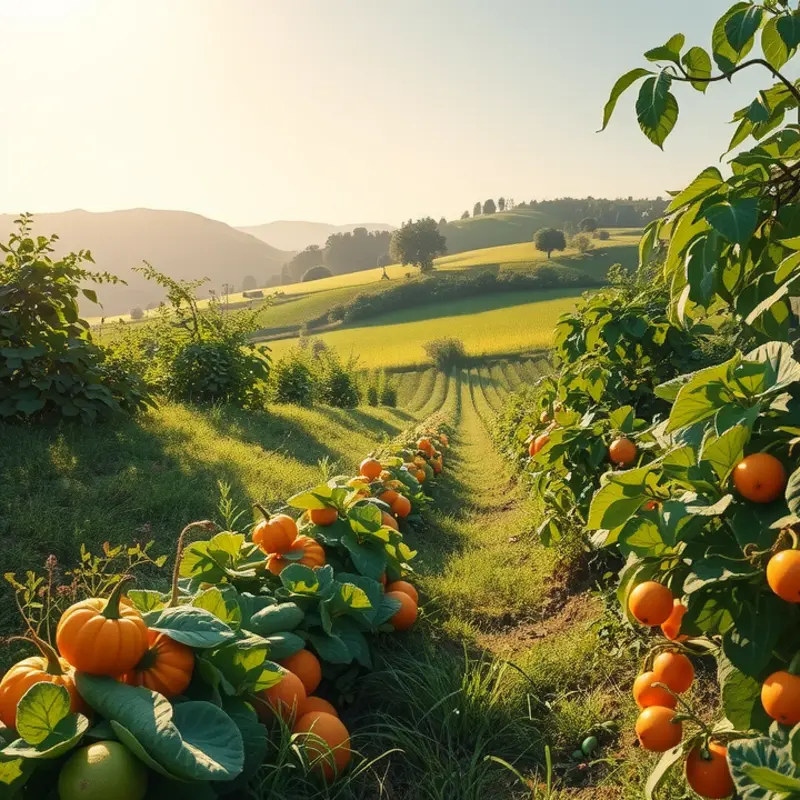Choosing environmentally beneficial plant foods is a powerful way to contribute to the health of our planet. With rising awareness of climate change, individuals are seeking ways to make healthier food choices that also support sustainability. From reducing carbon footprints to promoting biodiversity, each plant-based option we choose can create a positive impact. As you embark on this journey, understanding the benefits and practical steps to incorporate these foods into your diet will empower you to contribute to a thriving, eco-conscious lifestyle.
Nourishing the Earth: The Benefits of Choosing Plant Foods

Opting for plant foods is a powerful step towards a sustainable environment. They naturally contribute ecological benefits, reduce greenhouse gases, and promote biodiversity. This shift isn’t just a trend; it’s an essential adjustment for a greener planet.
Plant foods, particularly legumes and whole grains, play a remarkable role in environmental conservation. Legumes, like lentils, peas, and beans, enrich soil by fixing nitrogen. This means less need for chemical fertilizers, decreasing environmental pollution. Whole grains, requiring minimal water and energy resources, help reduce agricultural carbon footprints and maintain nutrient-rich soils for future crops.
Seasonal fruits and vegetables are another powerhouse in the eco-friendly food category. Growing them in sync with their natural season helps minimize energy use in farming, storage, and transport. When you choose to eat produce that’s in season locally, it also drastically cuts down on the miles these foods travel, reducing greenhouse gas emissions.
Choosing organic and local sources amplifies these ecological benefits. Organic farming avoids the use of synthetic fertilizers and pesticides, which can damage ecosystems. Buying foods from local farms supports your community and decreases the resources needed for transportation. Moreover, local produce is often fresher, retaining more nutritional value.
Promoting Biodiversity
Biodiversity benefits immensely from plant-based diets. Diverse plant consumption encourages varied farming, which supports multiple species and balances ecosystems. It reduces the reliance on monocultures, which often leads to soil depletion and pest infestations.
Tips for Integrating Plant Foods
Incorporating eco-friendly plant foods into your diet can be seamless. Start by exploring local farmers’ markets to discover fresh, seasonal produce. Not only will this support sustainable agriculture, but it will also introduce you to a wider variety of fruits and vegetables.
When planning meals, explore incorporating legumes and whole grains more robustly. Check out easy plant-based eating for inspiration. Batch cooking soups or stews with beans, lentils, and quinoa can save time while ensuring nutritious meals.
Lastly, advocate for meals low in processed foods. Focus instead on homemade recipes that allow full control over ingredients and sourcing. Consider starting a small herb or vegetable garden, if space permits, to further connect with the food cycle.
By choosing these plant foods, you deeply contribute to a sustainable environmental impact. Not only does it nourish your personal health, but it also fosters a commitment to preserving our planet’s resources for future generations.
Bringing Sustainability to Your Plate: Practical Plant-Based Choices

Incorporating plant-based foods into your meals not only nourishes your body but also treads lightly on our planet. The first step towards a sustainable plate is to focus on local and seasonal produce. These ingredients reduce the carbon footprint associated with transportation and often taste fresher due to their shorter supply chains. Visit local farmers’ markets or join a community-supported agriculture (CSA) group to access a vibrant variety of seasonally available produce. This initiative fosters a connection with the people who grow your food and supports sustainable farming practices.
Exploring plant-based cooking can be both enjoyable and impactful. Start by embracing simple recipes that highlight the flavors of local or seasonal produce. For instance, a hearty vegetable stew made with root vegetables, legumes, and spices can warm you on a chilly day while supporting your local economy.
To maximize sustainability, consider meal planning and batch cooking. Planning meals helps minimize impulse buys and ensures that everything you purchase gets consumed. Batch cooking large quantities of meals and storing them efficiently can significantly reduce food waste. Not only is it more resource-efficient, but it also frees up time during the week. Utilize practical ingredient batching techniques to streamline your efforts and make your cooking sessions more productive.
Mindful consumption extends beyond choosing plant-based foods; it’s about valuing all that you prepare and consume. Understanding portion sizes and using leftovers creatively are keys to waste reduction. For example, transform leftover roasted vegetables into a vibrant grain bowl or a filling wrap. Such practices honor the resources used in producing your food and enhance your kitchen creativity.
Additionally, embracing novel plant foods can rejuvenate your diet. Discover the array of plant-based proteins available, such as lentils or chickpeas, that provide essential nutrients without the environmental impact of animal proteins. Try quinoa salads, mushroom stir-fries, or almond milk smoothies to diversify your diet and support your health.
Incorporating eco-friendly foods into your diet also leads to a personal wellness journey. As you discover new flavors and nutritional benefits, you cultivate a balanced lifestyle that aligns with global sustainability goals. Aligning your dietary choices with environmental consciousness fosters a rewarding connection to nature, nourishing both the individual and the planet.
Final words
Choosing environmentally beneficial plant foods not only supports personal health but also plays a crucial role in preserving the planet for future generations. By understanding the ecological impact of our food choices and taking practical steps to incorporate plant foods into our diets, we can collectively move towards a more sustainable future. Whether it’s opting for seasonal produce, participating in local agriculture, or experimenting with new recipes, every small action contributes to this larger goal. Let’s make mindful choices that nurture our bodies and the environment, building a healthier, greener world for everyone.








